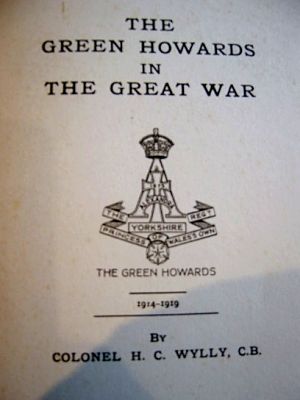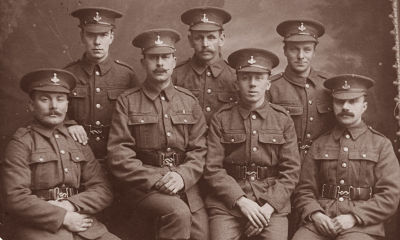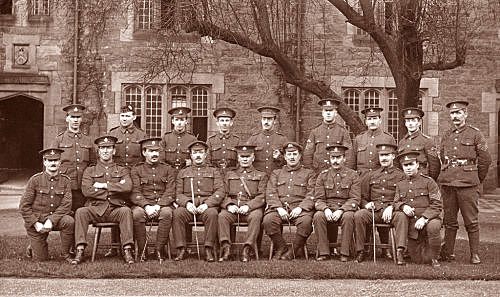
|
Reinforcements were sent to the 1/4th Battalion to replace the many losses from the two Training Units, the
2/4th and 3/4th Battalions of the Yorkshire Regiment.
Their experience during the course of the War is described thus by Colonel H. C. Willy. CB. in his book "The
Green Howards in the Great War".
THE 2/4TH TERRITORIAL BATTALION.
"Very shortly after the War had opened it became apparent that reserve Units of the Territorial Force would be needed to
take the place of the already existing Battalions of the Force, if and when these should be ordered abroad, and also as
a feeder to replace wastage in such Units. Army Order No 399 was then issued in September, 1914, authorising the
Territorial Force Associations to form a Home Service Unit for each one which had been accepted for Service overseas.
Even this initial expansion of the Force was soon found to be inadequate and on the 24th November instructions were
issued from the War Office conveying the decision that when an Imperial Service Unit proceeded overseas and was replaced
at home by its Reserve Unit, a second Reserve Unit was at once to be raised at the Depot or peace Headquarters of the
original Unit.
The question of raising a second Battalion for the 4th Battalion, the Green Howards was considered about the middle of
August, 1914 and on the 1st September the following Officers arrived at Northallerton, there to receive such
preliminary military training as the majority of them required, prior to the arrival of the non-commissioned Officers and
men: Lt Col W A Wharton, Majors the Hon A Orde-Powlett and A Fife. Captain and Adjutant Whitaker. Captains I H Hutton
Squire, A Dorman,"
|
 Men of the Yorkshire Regt at Clacton. No one identified.
Men of the Yorkshire Regt at Clacton. No one identified.
|
P C Leather, F Milbank, E S Jones, M J Wilson, H Theakstone and H Dixon. Lieutenants J L Reid, J C Kewley
A Wynne-Finch, A R Welsh, G F Lucas, G D Gardner, E H Pease, T G Thornton, C Bolckow, H G Scott, T S Rowlandson, D Maclaren,
C Cummins, G Tugwell, C E Pease and J K Stead.
About the 10th September the other ranks began to come in and by the end of the month the Battalion was a thousand strong,
but for some time there were no uniforms, blankets or boots available for issue.
In May, 1915, when the first draft was sent out to France, the Battalion was accorded the title of "The North Riding
Northern Coast Battalion", changed in the month following to "The 24th Provisional Battalion". By this the time the
Battalion had moved to Benton, but in July was sent to camp and later on to billets at Cramlington, with two Companies
at Blyth, where the winter of 1915 to 1916 was spent.
In April 1916, a move was made to Clacton on Sea and the Battalion
was there employed in digging trenches for occupation in the event of any possible landing by the enemy.
|
 |
4399/26199 Pte Bollands Frederick James. He enlisted in the 2/4th Battalion on 13 July 1915 and was transferred to the 16th Battalion Yorks and Lancs Regt, (a Transport Workers battalion) in July 1916. Service No 26199. He was attested at Colsterdale Camp.
He was demobbed on 27 March 1919 at Clacton-on-Sea.
His home address was 29 Hopkins Street, Middlesbrough, place of birth.
[Photograph and information kindly contributed by his Great Grand Nephew, Paul Bollands.]
In the Autumn
of this year Lt Col Wharton was invalided and the Command was temporarily assumed by Major Terry pending the arrival of
Colonel F F Bowesfield.
On the 1st January 1917, the name of the Battalion was changed for a third time, it now becoming the 18th Battalion of
the Regiment. In April it moved from Clacton to billets in Margate and became a unit of the 222nd Mixed Brigade,
Independent Force. the HQ being in Canterbury and the area allotted between the North Foreland and Broadstairs. Here
several air raids were experienced and one coast bombardment by a German submarine, one man of the Battalion being
killed.
Many drafts were sent out to France at this time and just before the Armistice one was dispatched to Malta.
After the Armistice Officers and men were gradually demobilised or sent abroad to Labour Corps in France or to Ireland,
such remained being employed in dismantling the coast defences."
|
2nd October 1914. 5th BATTALION RESERVES. Whitby Gazette:-
Lord Kitchener has authorised the raising of a Reserve Battalion for the 5th Yorkshires to replace Sir Mark Syke's Battalion, which has volunteered for foreign service.
The new contingent is for Home Defence. Lt Col - Major Chichester-Constable of Burton Constable Hall, near Hull. Captain Guy Graham [Rifle Brigade], Adjutant - Major D Mussenden Leathes of 3rd Yorks Regiment.
Recruiting will commence towards the end of the week, the principal centres covered by the 5th Battalion being Scarborough, Bridlington, Whitby, Malton, Driffield and Pickering.
It is confidently expected that there will be as enthusiastic a response as had been experienced in completing the new Reserve Battalion for the 4th Yorkshires under Colonel Wharton of Skelton Castle.
5th October 1914. "There a few vacancies still in H Company of the Reserve Battalion, 4th Yorks Regiment at Northallerton, into which the Old Boys from the High School have been drafted. If there are any Old Boys who are thinking of joining it is important that they should give Mr W Edwards, headmaster, their names at once as the vacancies are likely to be filled very soon."
6th Oct 1914. It was announced some weeks ago that the War Office had granted permission to the North Riding Territorial Association to establish a Reserve Battalion to the 4th Yorks, to take the place for Home Defence of those who had readily consented to give their services in foreign fields. Recruiting for Lord Kitchener's New Army was in full progress and the North Riding was not behind other parts of the Kingdom in supplying young men, but there was never any doubt as to Colonel Wharton getting the requisite number for his new Reserve Battalion.
Many who could not be accepted for foreign service found in this scheme an outlet for their patriotic activities and the fact that the Chairman of the County Territorial organisation, who had a long and honourable association with both the Volunteers and Territorials was to command, specially appealed to East Cleveland, which District is, as it should be, well represented in the list of both Officers and rank and file.
An excellent type of recruit has been enrolled without interfering with the response to the need of the nation for volunteers for action with Sir John French.
5 January 1915. The Court House at Northallerton is still occupied by the troops of the 4th Yorks Reserves, which necessitates the removal of prisoners to York Castle.
|
 Sgt Tunny, kneeling far Left, was a 4th Yorks Bn trainer. There are 3 other 4th Bn men.
Possibly on an Army course at a location not yet identified.
[Photograph kindly contributed by Alan Ward of Saltburn, N Yorks.]
Sgt Tunny, kneeling far Left, was a 4th Yorks Bn trainer. There are 3 other 4th Bn men.
Possibly on an Army course at a location not yet identified.
[Photograph kindly contributed by Alan Ward of Saltburn, N Yorks.]
|
3/4TH TERRITORIAL BATTALION.
"The 3/4th Battalion of the the Green Howards commenced training at Northallerton, N Yorks at the end of April 1915 with a
nucleus
of 200 men transferred from the 2nd Line Battalion and some dozen Officers who had been gazetted to the new Unit. The
Battalion was under the command of Lt Col Lord Southampton, who retained the Command until he resigned in Nov 1918. Lt Col
F F Deakin, who had formerly commanded the 1st Line Battalion in France, took over the Command on Lord Southampton's
resignation.
The Battalion was fortunate in obtaining excellent Headquarters in the Northallerton Grammar School, N Yorks the grounds of
which were of sufficient size to accommodate the large number of tents required for the Unit as soon as the recruiting campaign
- which on the whole was highly successful - commenced. The Unit remained under canvas till November, by which time the
Camp was a field of mud and weather was very cold. Vigorous protests having failed to produce any result, the CO took
matters into his own hands and commandeered all the suitable buildings in the town as billets.
|
These included the North Riding Jail, which was admirably adapted for the purpose. This, possibly, is the first occasion on which troops
were - voluntarily - billeted in a prison. Among other buildings taken over was the Workhouse. As this still left a large number
of men unprovided for, the Workhouse and various other suitable buildings at Thirsk were also taken. This gap of nine
miles between the two sections of the Battalion rather complicated training, but in spite of this the Unit maintained the
high standard it had adopted from the beginning and the reports it received showed that its efficiency was far above
the average of other similar Units.
6th October - SKELTON CASTLE KENNELMAN PINCHED POSTAL ORDERS OFF HIS ARMY MATES.
At Northallerton today Walter William Massey, a private in the 3/4th Yorks Battalion, Northallerton, late kennelman to Colonel Wharton, was charged with having stolen 3
Postal Orders, valued at 5s, 2s and 2s 6d.
The 3/4th and 2/4th Battalions of the Yorkshire Regiment were the Reserve/Training units in the UK to provide reinforcements to the 1/4th Yorks Battalion, which was in
action on the Western Front.
In the Skelton Parish Rate book for 1913, Massey is residing with 2 other workers at the New Kennels, Fishpond Field.
The first charge against him was stealing a PO value 5s, the property of James Whitehead of Norby, Thirsk between the 5th and 6th of August 1915. Secondly the theft of a
PO value 2s the property of John Francis Hall, Northallerton between 16th and 22nd August and thirdly stealing a PO value 2s 6d, belonging to J F Hall.
The accused was the Postal Orderly for the 3/4th Battalion, entrusted with the delivery of letters to his comrades.
On the 16th August, Mrs Hall sent a PO to her husband Private Hall. He did not receive it.
Some days later Massey played cards and handed a PO order in payment to a soldier called Ditchburn for 2s, which had been issued at Middlesbrough.
Ditchburn informed his Commanding Officer of the fact, as complaints had been made by men of not receiving orders. A similar story was found in regard to other missing
POs.
Inquiries at the Northallerton Post Office showed that the accused had cashed them.
He was sentenced to 2 months imprisonment.
Massey must have served his time in prison, returned to the 3/4th Battalion and eventually been posted to the 1/4th Battalion in France as 3277 Private Massey.
He was killed on the 17th September 1916 in the later stages of the Battle of the Somme, when the 4th Yorks were ordered to attack German trenches near Martinpuich.
Many men were lost and their bodies never recovered. Private Walter William Massey has no known grave and is commemorated with 72,000 others on the Thiepval Memorial.
He was the son of Hannah Massey, of The Barracks, Cirencester, Glos and the late Henry Walter Massey.
He should probably have been remembered on the Skelton War Memorial, as other Skelton Castle employees of 1913/14 are.
In the Spring of 1916 the Battalion moved to Redcar, N Yorks where it occupied billets in several large buildings. Here it
not only carried on its duties as a Training Unit, but was responsible for a sector of coast defence. The frontage allotted
to the Battalion was from the pier to Tod Point and certain posts had to be maintained day and night. What with this, the
manning of the trenches by the whole Unit whenever a sea or air raid was rumoured, and emptying the trenches of the sand
which filled them every time the wind blew, training was considerably hampered during this period.
In September 1916, a scheme of amalgamation of all the 3rd Line Units led to the incorporation of the 3/4th and the 3/5th
Battalions, which were henceforth known as the "4th [Reserve] Battalion Yorkshire Regiment". The function of this new
Unit was to feed the 1st Line Territorial Battalions. A month or two later the Unit was moved to Catterick, where it
remained till July 1917, after which it was transferred to Sutton near Hull, and later to Hornsea, where it was again
responsible for a sector of coast defence. During the Summer months the troops were under canvas and in the Winter in the
Hydro and other houses in Hornsea. The Unit was finally disbanded in 1919."
|
|



